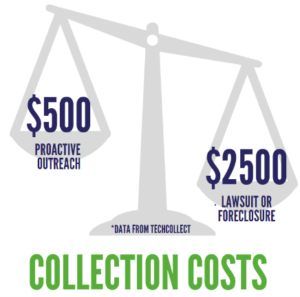VACCINATE your 2022 budget
Good News: We are exiting the pandemic! Many have found new freedom in their work routine, increased wages, higher home values, and healthy stock portfolios.
Bad News: Some have really struggled, and the programs that helped them stay afloat are expiring. Forbes referenced a Harvard research project that explains how hard some have been hit.
5 Ways to save:
- Lock in Prices Now: If you have good vendors in place, negotiate extension of their agreements now. Going out for bid on contracts will be a harsh wakeup call. Vendors worth their salt have plenty of work, and most are being forced to pay higher wages. If you can lock in current pricing or even a modest increase, do it now.
- Review Long Term Agreements: If you already have multi-year agreements in place, review them to make sure you have strong termination provisions. You cannot afford to get a last-minute termination notice in this environment.
- Prioritize Capital Projects: Material prices are skyrocketing. You may need to revisit your reserve budget and push back some projects until prices come back to earth.
- Support from Utilities: Input from your utility providers may help you reduce expenses through a variety of programs. Government regulations and incentives have your utility providers looking for ways to help you reduce consumption – take advantage of it!
- Insurance Deductibles: Check the amount of your insurance deductible and determine if it can be increased. The goal should be to minimize the cost of insurance, have adequate emergency reserves, and only use insurance for significant loss events.
When it comes to revenue, the calculation is simple: community associations need 100% of it. In the most recent issue of Common Ground, CAI identified some chilling statistics that could impact delinquencies. Mortgage delinquencies have doubled since the start of the pandemic. And a survey of CAI members found that 5% of owners were 90 days or more behind on assessments. Giving adequate attention to projected revenue for your community is essential in this environment. Here are some ways to “vaccinate your budget” against decreased revenue.
5 ways to retain revenue:
- Look for trends. How has your AR and collection expense changed compared to 2020? What happens if you extend that pattern through 2021? Now double it based on the elimination of federal moratoriums and subsidies.
- Revisit your budgets from 2009-2011. No one thought we would repeat the Great Recession, but pandemics don’t respect economic cycles.
- Make sure your financial statements show visibility and ROI into all collection costs:
- What is the total time and total cost of recovery for each delinquency?
- Create a line in your budget item for unrecovered legal/collection fees
- Create a Bad Debt line item in your budget for unpaid assessments
- Ask your collector or attorney to defer their fees. Communities struggling with unpaid assessments can’t afford to pay fees now in the hope that they are recovered in the future.
- Share the pain. If collection and legal costs are deemed unreasonable, or if they are reduced in order to get a settlement, ask your collector to absorb those costs.
According to TechCollect, a data and predictive analytics provider, the average cost assessed to a homeowner for a lawsuit or a foreclosure is around $2,500. Alternatively, their data shows that the average cost of collections without legal action is around $500. Up to 60% of owners will resolve their account without legal action if given an appropriate opportunity. Predictive analytics and data mining improve results by providing multiple communication methods for outreach along with a path to the shortest and least-punitive resolution.

Law firms that perform collections rarely have the resources or incentive to provide effective proactive efforts. And the collection policies proposed by many attorneys suggest prompt legal action after a single warning letter. This is troubling for Boards that want to avoid costly legal action against their members.
Bottom line: There is great uncertainty regarding increased expenses and revenue loss for communities. Some resourceful and proactive effort can limit increased expenses, and data science can tell us how best to preserve revenue while making legal action increasingly rare. More settlement options and better recovery methods are a positive evolution for our industry. And the fiduciary obligation of Boards and managers is well-served by finding human-first solutions that reduce the need for legal action.
Besides, a compassionate, proactive approach, like the one detailed below, is just good business.
- Risk assessment prior to collection action
- Evaluate risk of bankruptcy, military activity, bank foreclosure, etc.
- Proactive outreach prior to legal action
- Phone, email, SMS and Social Media
- Debtor location methods for effective communication
- Address, emails, phone numbers, and digital footprint
- Payment plan options
- Utilize a Hardship Calculator to standardize payment plans
Gar Liebler is active in real estate investment and technology services for the property management industry. His original property management firm, LandArc, was founded in 1985 and sold in 2015.
Equity Experts is a tech-based collection and foreclosure service for assessment recovery in community associations. www.equityexperts.org
